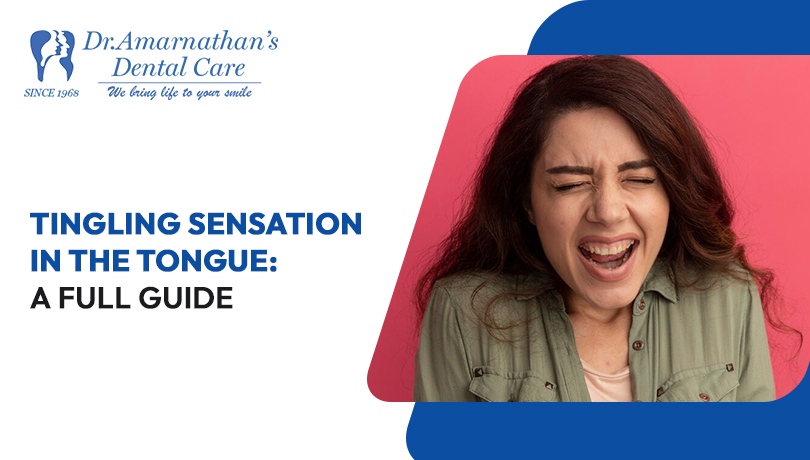
Tingling sensation in the tongue: A full guide
Tingling sensations in the tongue, also known as paresthesia, can be either short or chronic and affect many people. Experiencing this unusual tingling sensation in the tongue might range from a bit of inconvenience to a painful condition.
While the underlying reasons for tingling feelings in the tongue might vary greatly, recognizing the various triggers and repercussions is critical for successful management and therapy. This blog covers insight into the causes, symptoms, diagnosis, and treatment options for tingling sensation in the tongue.
Tingling feeling in tongue – How does it feel?
A tingling sensation in the tongue is typically described as small pins and needles or a slight prickling. It can be like the sensation of your foot falling asleep but on your tongue. It might be weak and scarcely detectable or more severe and painful. Some individuals report it as a slight buzzing or numbness, which can occasionally be accompanied by burning or itching. The sensation might come and go or last for a time, affecting the entire tongue or just a tiny portion of it.
Causes of Tingling Sensation in the Tongue:
Common Causes:
1) Nutritional Deficiencies
Lack of vitamins or minerals: Tingles can be caused by a lack of essential vitamins (such as B12) and minerals (such as iron and folic acid), all of which play critical roles in nerve health.
2) Allergies & Food Reactions
Food allergies: Certain foods, such as nuts, shellfish, and particular fruits, might cause tingling due to allergic responses.
Oral allergy syndrome (OAS): This occurs when the immune system responds to proteins found in fresh fruits, vegetables, and nuts, causing tingling sensations.
3) Oral Health Issues
Canker sores: These tiny, painful ulcers in the mouth can create a tingling feeling, especially when aggravated by food or drink.
Burning Mouth Syndrome: It involves a burning or tingling feeling in the mouth, typically without a known reason.
Dental procedures: Dental procedures might induce transient tingling as a result of nerve irritation or anesthetic.
4) Medications and substances
Medications: Tingling is a side effect of several drugs, especially those used to treat high blood pressure or anxiety.
Toxins: Toxic and heavy metal exposure can cause nerve damage and tingling feelings.
Medical Conditions
1) Neurological Conditions
Migraines: Tingling in the tongue may occur during the aura phase of a migraine, which is frequently accompanied by visual problems and other sensory alterations. This phase usually occurs before the headache and might act as a warning indicator of an upcoming migraine episode.
Nerve Damage: Nerve damage, whether due to accident, surgery, or systemic disorders, can induce tingling sensations in the tongue.
2. Systemic Conditions:
Diabetes: Poorly treated diabetes can cause neuropathy, which affects nerves throughout the body, including the tongue.
Hypoglycemia: Low blood sugar levels can produce neurological symptoms such as tingling in the tongue and lips.
Hypocalcemia: Low calcium levels in the blood can impair muscle and nerve function, causing tingling feelings in many regions of the body, including the tongue.
Diagnosing the Cause of a Tingling Tongue
Medical History and Physical Examination: A complete medical history and an evaluation by a healthcare expert are critical initial measures. Discuss any further symptoms, medications, and food habits.
Blood tests: Blood testing can detect nutritional deficits, blood sugar levels, and other indicators of systemic illnesses.
Allergy Testing: If food allergies are suspected, an allergist can do tests to identify the exact allergens.
Neurological Evaluation: If you have chronic or inexplicable tingling, you should see a neurologist to rule out illnesses like MS or other neurological problems.
Imaging studies: In certain circumstances, imaging tests such as MRIs or CT scans may be necessary to rule out underlying causes such as tumors or structural problems.
How to Get Rid of a Tingling Tongue
If you have a tingling sensation in the tongue, you can take the following procedures to relieve the discomfort and treat any underlying causes:
1. Identify and address nutritional deficiencies
Dietary Changes: Include foods high in essential vitamins and minerals, such as leafy greens, fish, chicken, and fortified cereals.
Supplements: If you have been diagnosed with a deficiency, take the suggested supplements for vitamin B12, folic acid, or iron.
2. Manage Allergies
Avoid Triggers: Identify and avoid foods or substances that cause an allergic response.
Medications: To treat allergy symptoms, take antihistamines or other allergy drugs as prescribed by your doctor.
3. Maintain good oral health
Oral hygiene: Brush and floss often to avoid oral health problems such as canker sores.
Topical treatments: To soothe the tongue, use analgesic or antibacterial mouthwashes or gels.
4. Treat the underlying health conditions
Diabetes Management: Medication, food, and lifestyle changes can all help to monitor and regulate blood sugar levels.
Hypoglycemia: To keep your blood sugar levels steady, eat and snack regularly.
5. Adjust medications
Consult your doctor: If a drug is causing the tingling, your doctor may decrease the dosage or recommend an alternative.
6. Address neurological causes
Medical Evaluation: Consult a neurologist if the tingling is persistent or severe. Nerve pain medicines and physical therapy are two options for treatment.
Migraine Management: If migraines are the reason, treat them with the proper drugs and lifestyle adjustments.
7. Symptom Relief
Pain relievers: To reduce discomfort, take over-the-counter pain medications such as acetaminophen or ibuprofen.
Avoid Irritants: Avoid spicy, acidic, or scorching meals and beverages, which may increase the tingling.
8. Nerve Therapy
Treatments: To relieve nerve-related tingling, try transcutaneous electrical nerve stimulation (TENS), acupuncture, or nerve blocks.
9. Hydration & Saliva Production
Stay hydrated: Drink lots of water to keep your mouth hydrated.
Chew sugar-free gum: Increase saliva production to relieve dryness and tingling.
When to Seek Medical Help
Seek medical help if:
Persistent symptoms:If the tingling sensation in your tongue stays for more than a few days after using home remedies, you should visit a healthcare expert.
Accompanied by other symptoms: If the tingling is associated with symptoms such as numbness, weakness, trouble speaking or swallowing, visual problems, or loss of coordination.
History of chronic conditions: If you have a history of chronic illnesses such as diabetes or neurological problems and are experiencing new or worsening symptoms.
Allergic Reactions: If you suspect an allergic response, look for signs like tongue or throat swelling, trouble breathing, or a rash.
Medication Concerns: If you feel that pharmaceutical side effects are causing the tingling, see your doctor for an examination and any modifications.
Consultation with a healthcare expert is essential for obtaining an accurate diagnosis and developing a treatment plan based on the particular cause of the tingling sensation in the tongue.
Conclusion:
To summarize, recognizing the cause and symptoms and when to seek medical attention for tingling sensation in the tongue is essential for maintaining dental and overall health. Individuals who follow the advice presented in this thorough book can make proactive efforts to address underlying concerns, relieve suffering, and enhance their quality of life. Remember, if you have persistent or worrying symptoms, do not hesitate to contact a healthcare expert for individualized care and assistance.




